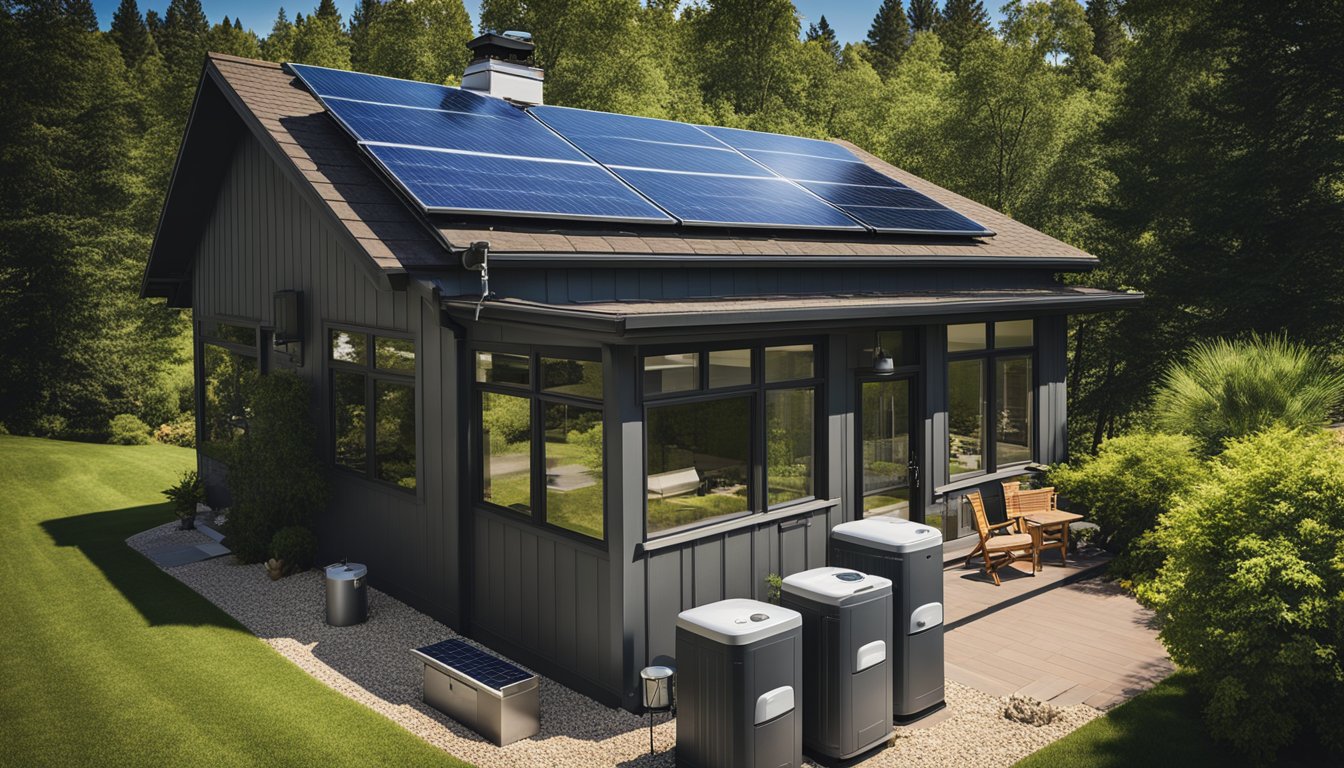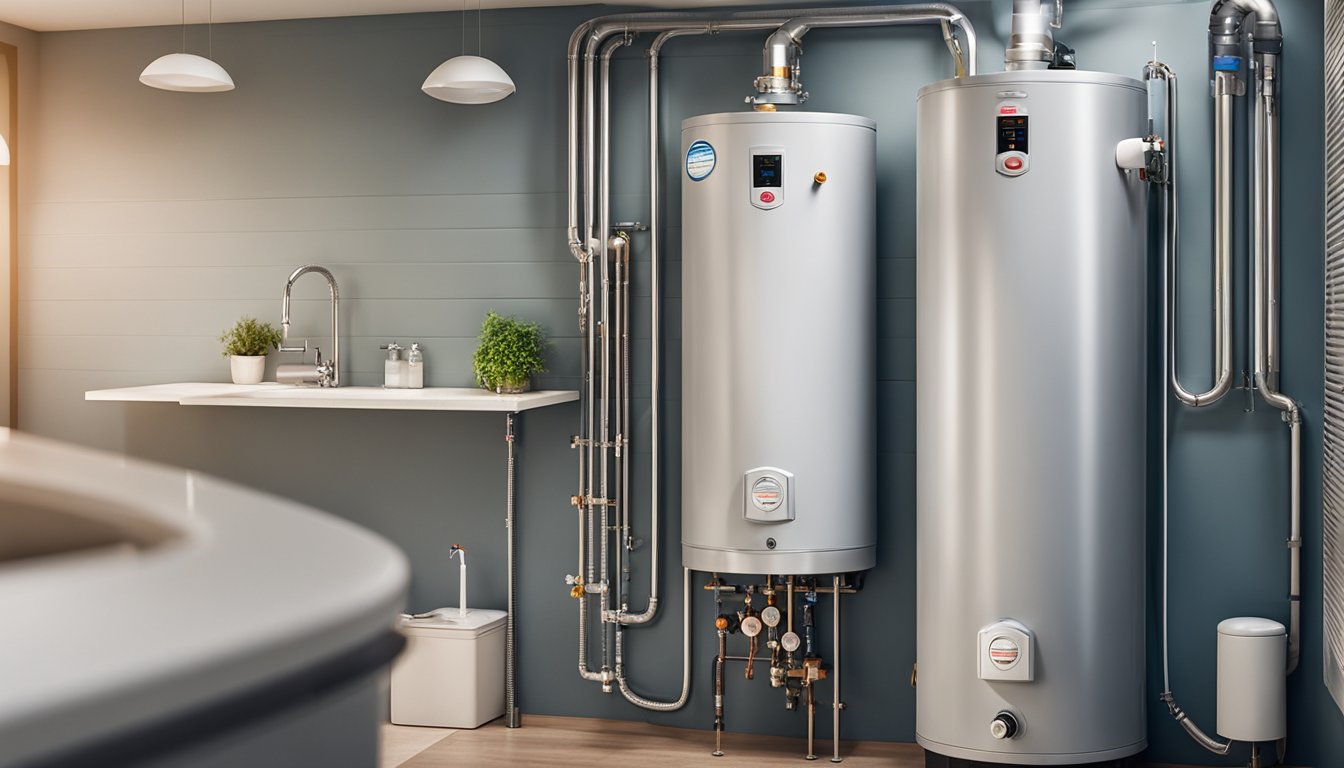Late updated: 14 Dec 2024 12:12
Written by: Eleanor Hartman
Guide To Eco-Friendly Home Water Heating Solutions: Efficient and Sustainable Options
The demand for eco-friendly solutions in our homes is rising, and water heating is a significant aspect to consider when seeking an environmentally conscious lifestyle. Traditional water heaters often rely on fossil fuels, contributing to greenhouse gas emissions and global warming. Opting for sustainable water heating systems reduces energy bills and minimises our carbon footprint. By embracing innovative technologies, we can make our homes greener while enjoying the benefits of energy efficiency.

The transition to greener water heating solutions offers a variety of options, such as solar, heat pump, and tankless water heaters. These systems not only enhance energy savings but also contribute to a sustainable future by reducing reliance on non-renewable resources. As we explore these choices, we empower ourselves to play a part in addressing climate change and preserving the environment for future generations.
To make the most of these eco-friendly alternatives, we should focus on understanding the benefits each technology offers and how it fits our specific needs. This guide will explore various sustainable solutions, providing insights into improving efficiency and maximising energy savings.
Key Takeaways
- Sustainable water heaters reduce energy bills and emissions.
- Available options include solar, heat pump, and tankless systems.
- These solutions support energy efficiency and climate goals.
Sustainable Home Water Heating Technologies
We explore advanced technologies for heating water sustainably, focusing on systems that utilise renewable energy sources. Our aim is to reduce energy usage and the carbon footprint of our homes by implementing efficient solutions.
Heat Pumps
Heat pumps, including air source and ground source variants, are efficient options for heating water. Heat pump water heaters capture heat from the air or ground and transfer it to the water, significantly reducing energy consumption.
Air source heat pumps absorb heat from the outdoor air, even in colder temperatures, making them suitable for mild climates. Ground source heat pumps extract heat from the ground, providing consistent efficiency throughout the year. These systems require an upfront investment, but the long-term savings in energy bills compensate for the costs.
Solar Water Heating Systems
Utilising solar power through solar water heaters is a viable method for reducing reliance on traditional energy sources. Solar panels collect energy from the sun, which is then converted into heat for domestic water use. These systems are most effective in areas with abundant sunlight.
Solar water heating can drastically cut down on the use of electricity or gas, leading to lower utility bills. Installation typically involves placing solar panels on rooftops, and while the initial costs can be high, government incentives may offset these expenses.
Biomass Boilers
Biomass boilers offer an eco-friendly alternative to fossil fuel-based heating systems. They use organic materials such as wood pellets, chips, or logs to produce heat. By burning these renewable resources, biomass boilers provide a sustainable way to heat water, reducing our reliance on non-renewable energy sources.
The operation of biomass boilers can be tailored to individual homes, with different sizes and types available. While they do have a larger physical footprint and require regular maintenance, they contribute substantially to lowering our carbon footprint.
Enhancing Efficiency and Energy Savings

To maximise energy savings and reduce carbon emissions in home water heating, it's important to focus on effective insulation, smart technology, and upgrading to modern eco-friendly systems. Each strategy enhances efficiency and curtails costs over time.
Insulation and Heat Loss Prevention
Insulation is a critical factor in maintaining temperature and preventing heat loss. Properly insulated water heaters and pipes can significantly reduce energy costs. We should aim to insulate exposed pipes with foam sleeves and use insulating blankets for hot water tanks. Draft-proofing in the surrounding area will further help to maintain consistent temperatures.
Upgrading windows and sealing gaps also contributes to efficient heat retention. This approach not only conserves energy but also lowers carbon emissions. Efficient insulation minimises the demand on our heating systems, delaying the need for expensive repairs or replacements.
Smart Thermostats and Controls
Smart thermostats and heating controls offer dynamic ways to manage energy use. These devices allow us to schedule heating, adjust temperatures remotely, and monitor usage patterns. Smart technology adapts to our routines, meaning heating is only used when necessary.
For water heating, this means lower energy waste and more precise management of consumption. By integrating smart devices with modern electric radiators or tankless water heaters, we create a more cohesive and responsive eco-friendly heating system. The key benefit here is the ability to maintain comfort efficiently while reducing utility bills.
Upgrading to Eco-Friendly Systems
Choosing modern solutions like electric combi boilers or geothermal heating systems greatly enhances efficiency. Eco-friendly heating solutions are specifically designed to minimise environmental impacts and reduce energy consumption. Geothermal heat pumps utilise constant ground temperatures to heat water, presenting long-term savings and efficiency.
Hydronic heating systems, which use water to distribute heat, also offer an effective, environmentally friendly alternative. Consider replacing traditional oil boilers with modern, sustainable options to reduce energy costs and improve home efficiency. By opting for these advanced systems, we contribute to lower carbon emissions and a healthier planet.
Frequently Asked Questions

In this section, we tackle common queries regarding eco-friendly home water heating solutions. We focus on hybrid water heaters, heat pumps, and their efficiency compared to traditional systems.
What distinguishes a hybrid water heater from a heat pump?
Hybrid water heaters combine heat pump technology with traditional heating elements. They primarily use ambient air to heat water but switch to electric heating during high-demand periods. Heat pumps, in contrast, solely rely on extracting heat from the surrounding environment, making them more efficient but potentially slower in heating capacity.
What potential disadvantages might one encounter using a hybrid water heater?
Hybrid water heaters can have higher upfront costs compared to conventional water heaters. Additionally, they require ample space for proper ventilation and may be less effective in extremely cold climates. Maintenance can also be more complex due to their dual-operation nature, needing both heat pump and electric components to be serviced.
How do hybrid water heaters compare with traditional electric models in terms of efficiency?
Hybrid water heaters are generally more energy-efficient than traditional electric models. They can consume up to 60% less energy by primarily relying on ambient air for heating. This efficiency can significantly reduce electricity bills, making hybrids a cost-effective long-term solution for many households.
What constitutes the greenest method for heating domestic water?
Using solar water heaters is considered the greenest method. These systems harness solar energy to heat water, drastically reducing reliance on fossil fuels and minimising greenhouse gas emissions. While they require sunny conditions to function optimally, they offer an excellent eco-friendly option for suitable regions.
Which type of water heater is considered the most beneficial for the environment?
Solar water heaters are most beneficial due to their minimal environmental impact, relying on renewable solar energy. Heat pump water heaters also rank highly due to their efficiency and reduced emissions, but they still depend on electricity to some extent, unlike solar systems that utilise completely renewable sources.
In terms of home water heating, what approach is deemed the most energy-efficient?
Heat pump water heaters are frequently acknowledged as the most energy-efficient option. They utilise ambient air heat, which requires far less electricity compared to traditional electric water heaters. By saving up to 70% on electricity costs, they offer substantial energy savings while reducing the carbon footprint of a household.